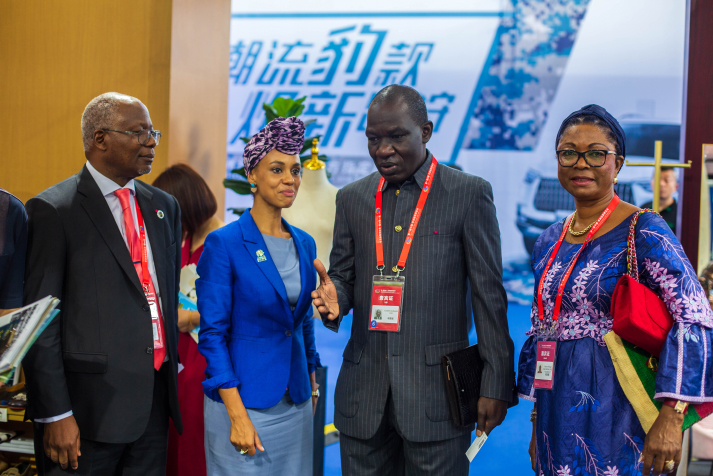|
||||||||||
| Home Nation World Business Opinion Lifestyle ChinAfrica Multimedia Columnists Documents Special Reports |
|
||||||||||
| Home Nation World Business Opinion Lifestyle ChinAfrica Multimedia Columnists Documents Special Reports |
| ChinAfrica |
| A Kenyan entrepreneur facilitates business cooperation between China and Africa |
| To fight poverty and promote the development of her continent, the ally for Hannah Ryder, a Kenyan entrepreneur, is obvious: China |
| By Christophe Alexandre VOL.12 August ·2020-07-24 |

Anyone who joins a fight must know how to surround oneself with reliable allies. To fight poverty and promote the development of her continent, the ally for Hannah Ryder, a Kenyan entrepreneur, was obvious: China.
Multiple roles
Ryder wears many hats: entrepreneur, economist, diplomat, development expert, and also wife and mother.
Born in Kenya, she describes herself as a citizen of the world. At the age of 10, she moved to the UK with her family where she went on to obtain a bachelor's degree in economics. The young graduate then embarked on a career in government focused on building strong relationships between the UK and developing countries, including Kenya. This career finally brought her to China, where she has lived for five years.
"Working in development for almost 20 years and having traveled to nearly 50 countries, I realized early on that China had a significant impact on poor countries like Kenya. So I felt that if I wanted to do something positive for the rest of the world, understanding and engaging with China would be the key," Ryder told ChinAfrica. She therefore started to look for opportunities to work in China and got a job at the UN in Beijing, where she spent two years on promoting cooperation between China and other countries.
"Through my work, I realize that many entities came to the UN, such as embassies, organizations and trading partners, wanting to improve their relations with China. On the other hand, many Chinese government departments and non-government organizations want to reach out to others, but not sure how to do it effectively," she said. But, at the time, Ryder realized that the UN was not responding to needs as quickly and effectively as expected. After a discussion with her husband, who was also working in China, she decided to stay in Beijing to do something to fill these enormous gaps and facilitate understanding and relations between different sides.
To achieve this, Ryder created Development Reimagined (DR), a consultancy and think tank on international development headquartered in Beijing.
Innovation
DR aims to provide new solutions to address the complexities of poverty reduction and sustainable development, by drawing on the experience of the whole world, especially China, as well as by piloting new ideas.
"A recent research of my company showed that a faster pace of poverty reduction is required in Africa to reach the UN Sustainable Development Goals (SDGs) by 2030, compared to the pace of China's anti-poverty process. In fact, achieving this goal would require a new world record in the pace of poverty reduction. It involves lifting almost 400 million people out of poverty in just over 10 years", Ryder noted. In her opinion, China offers a unique potential for aid to Africa, partly thanks to its experience but also due to its economic power. "This is why African countries and China must work very hard as soon as possible to improve economic growth and development in Africa," estimated Ryder.
Being based in China, DR has established reputation by helping governments and businesses to get the most out of their relationships with China, including through trade, investment and even tourist and media collaboration, as well as aid. The company also provides services in the other direction, helping Chinese ministries, businesses and NGOs to better understand African countries and make a positive impact.
"We are available, upon request, to help empower African and Chinese stakeholders, as well as others who wish to support them, by providing them with more information and opportunities for practical interaction," said Ryder. This is to enable informed decision-making that leads to economic growth and creation of more jobs, and reduction of poverty in Africa in particular.

Another Africa
"Overall, in many ways, while China is very attractive and exciting, it can also be too complex and difficult to understand for international companies," noted Ryder. For her, governments must help their businesses in operating in China and also work harder to accelerate progress on key issues such as trade agreements. In the past, countries have even taken 10 years to negotiate the launch of a new product in China. That's too long, especially for African countries which desperately need new value-added markets and new partners. "This need for support is also the reason why we created the Africa Reimagined platform", she told ChinAfrica.
In June 2019, for the First China-Africa Economic and Trade Expo, the DR team launched its very first tailor-made program for entry into the Chinese market, called Africa Reimagined. "We started this pilot project because we knew that most African companies are not aware of the vast opportunities that the Chinese market can offer to develop their businesses. Most African SMEs turn to the United States, where consumption increases by 2 percent year on year, but in China, it increases by 16 percent per year," noted Ryder.
African companies are not sufficiently prepared and lack the resources necessary to enter the Chinese market. They do not understand the trends of the Chinese market and official requirements, not to mention the language. The Chinese market is large, complex and highly regulated, so many foreign companies rely on trade facilitation organizations while doing business in China.
For the expo, Ryder and her team contacted more than 50 African brands in multiple sectors and ultimately reduced the number of participants to seven exciting, innovative and sustainable ones. These brands operate in different sectors such as lifestyle, fashion, jewelry and skin care, and come from Nigeria, Tanzania, Ethiopia, Zimbabwe, South Africa, Ghana and Rwanda. "All of the brands have a strong sustainability component in their business models, with commitments to reduce poverty and promote ethical business practices across their supply chains," claimed Ryder. These companies disrupt the stereotypes about African products and employ hundreds of people directly and thousands indirectly in their local communities, she said.
"These brands were all impressed with the response in China and found it very helpful to better understand the Chinese market. Some are taking concrete steps to enter China," asserted Ryder, adding that if these companies are able, for example, to double their workforce through their investments in China, that would mean hundreds of people. "Imagine if this were extended to more countries and companies, those that maintain their supply chain in Africa, those that directly contribute to poverty alleviation and those that change the way people perceive Africa. That will bring immense benefits to both sides."
(Printed Title: Rethinking Our World)
Comments to zanjifang@chinafrica.cn
| About Us | Contact Us | Advertise with Us | Subscribe |
| Copyright Beijing Review All rights reserved 京ICP备08005356号-5 京公网安备110102005860号 |